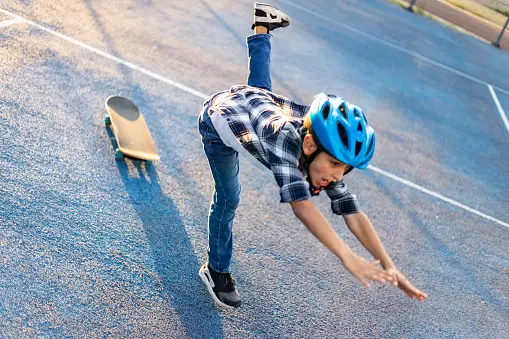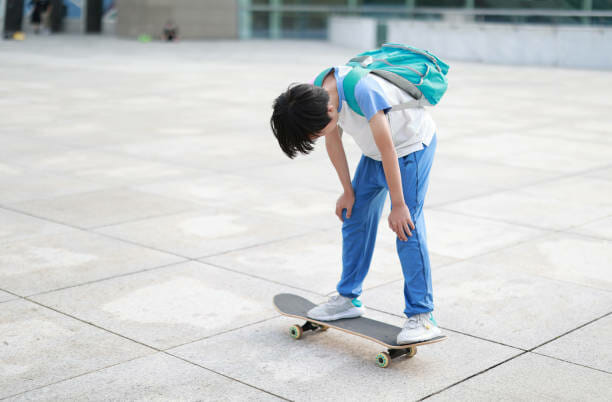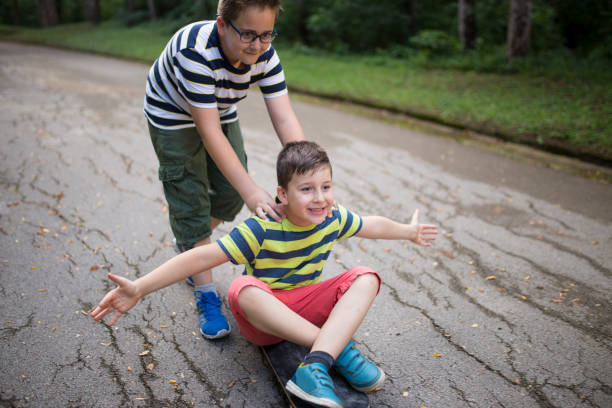Have you ever considered skateboarding as a way to enhance your child’s development? As a parent, you’re always looking for ways to help your child grow and develop into a well-rounded individual, and skateboarding might just be the answer you’ve been searching for.
Skateboarding isn’t just a fun hobby or pastime – it’s also a fantastic way to boost your child’s physical, social, and emotional development.
From improving their balance and coordination to building their confidence and resilience, skateboarding has a wide range of benefits that can help your child thrive both on and off the board.
In this article, I’ll be diving into the world of skateboarding and exploring how it can positively impact your child’s development.
Whether your child is a beginner or an experienced skater, there’s something here for everyone.
So, let’s grab our boards and hit the pavement – it’s time to explore the amazing benefits of skateboarding and child development!
Physical Development: Improving Balance and Coordination
Skateboarding isn’t just about perfecting your skills on the board. It’s also a great way for your child to connect with others and build their social skills.
Skateparks are often bustling with other skaters of all ages and backgrounds, providing a unique opportunity for your child to interact and form connections with others who share their passion for skating.
Whether it’s collaborating on new tricks or simply cheering each other on, skateboarding can help your child develop important social skills such as teamwork, communication, and empathy.
So, encourage your child to hit the park and make some new friends – who know, they might just find their next skateboarding buddy for life!
And as they build their social connections, they’ll also be improving their physical development by practicing balance and coordination on their board. It’s a win-win situation!
Emotional Development: Boosting Confidence and Resilience
Skateboarding is not only a great way for your child to make new friends and build social connections, but it can also help boost their emotional development by building their confidence and resilience.
When your child learns a new trick or successfully navigates a challenging obstacle, they’ll feel a sense of accomplishment and pride in themselves.
This can do wonders for their self-esteem and confidence, both on and off the board.
Additionally, skateboarding can help your child develop resilience by teaching them to persevere and keep trying, even when they fall or fail.
This valuable skill can translate into other areas of their life, helping them navigate challenges and setbacks with a more positive and resilient attitude.
So, encourage your child to keep pushing themselves on their skateboard and remind them that it’s okay to fall – it’s all part of the learning process.
With each new accomplishment, they’ll build their confidence and resilience, helping them thrive both in and out of the skatepark.
Cognitive Development: Enhancing Problem-Solving Skills
Skateboarding isn’t just a physical activity – it can also help enhance your child’s cognitive development by improving their problem-solving skills.
As your child navigates the skatepark or tries out new tricks, they’ll encounter obstacles and challenges that require them to think creatively and come up with solutions.
This can help improve their cognitive flexibility and problem-solving abilities, both of which are essential skills for success in school and beyond.
Additionally, skateboarding can help your child learn to think critically and make decisions quickly, which can come in handy in a variety of situations.
Plus, as they collaborate and interact with other skaters, they’ll learn valuable social skills such as communication and teamwork, making skateboarding an excellent all-around activity for enhancing cognitive and social development.
So, encourage your child to keep practicing and pushing themselves on their skateboard – they’re building skills that will serve them well for years to come.

Learning to Fall: Developing Perseverance and Resilience
One of the most valuable lessons that skateboarding can teach your child is how to fall – and get back up again. As your child practices their skateboarding skills, they’ll inevitably take a spill or two.
But each time they fall and get back up, they’re building their perseverance and resilience.
This is an important life skill that can help them overcome challenges and setbacks in all areas of their life, not just on the skateboard.
Plus, learning to fall safely and get back up again can help your child develop a sense of confidence and courage, as they learn to face their fears and take risks in a safe and controlled environment.
So, when your child takes a tumble on their skateboard, encourage them to dust themselves off and try again.
Remind them that falling is just part of the learning process and that each time they get back up, they’re getting closer to mastering their skills.
With time and practice, they’ll become more resilient and confident both on and off the board.
Creative Expression: Finding Freedom on the Board
Skateboarding is more than just a sport – it’s a form of creative expression that can help your child find freedom and joy.
When your child is on their board, they have the opportunity to express themselves in a unique and personal way, whether through the tricks they perform or the style they bring to their riding.
Skateboarding can be a great way for your child to explore their creativity and find their own voice. And as they practice and improve their skills, they’ll develop a sense of confidence and pride in their abilities.
Additionally, skateboarding can be a great way for your child to connect with others who share their passion.
Whether it’s through skating together, sharing tips and tricks, or simply hanging out at the skatepark, your child can develop valuable social connections and friendships through their love of skateboarding.
So, encourage your child to embrace their creativity and express themselves through their skateboarding. Who knows – they might just discover a lifelong passion and a community of like-minded individuals along the way.

Developing a Growth Mindset: Embracing Challenges and Learning from Mistakes
Skateboarding can be a powerful tool for developing a growth mindset in your child. When your child is learning to skate, they’re bound to face challenges and make mistakes along the way.
But rather than giving up or getting discouraged, they can learn to embrace these challenges as opportunities for growth and learning.
By pushing themselves to try new things and take risks on their board, they’ll develop a sense of resilience and perseverance that will serve them well in all areas of life.
And as they learn from their mistakes and overcome obstacles, they’ll develop a sense of confidence and self-efficacy that will help them tackle future challenges with ease.
Additionally, skateboarding can be a great way for your child to connect with other skaters who share their mindset of growth and continuous improvement.
They can learn from other’s experiences, share tips and tricks, and support each other in their individual journeys.
So, encourage your child to embrace the challenges and mistakes that come with skateboarding, and to use them as opportunities for growth and self-improvement. With a growth mindset, the possibilities are endless.
Setting and Achieving Goals: Cultivating a Sense of Accomplishment
Skateboarding can be a powerful way for your child to learn the importance of setting and achieving goals.
Whether it’s mastering a new trick, improving their speed and agility, or simply riding their board for longer periods of time, there are endless opportunities for your child to set goals and work towards achieving them on their skateboard.
By setting realistic and achievable goals, they can develop a sense of purpose and direction in their skating, and feel a sense of accomplishment when they reach their milestones.
And as they work towards their goals, they’ll learn the value of persistence and hard work, and develop a sense of determination that will serve them well in all areas of life.
Additionally, by sharing their goals with others and seeking feedback and support, they can build connections with other skaters who share their passions and help them stay accountable to their goals.
So, encourage your child to set goals for themselves on their skateboard, and to celebrate their achievements along the way.
With a sense of purpose and direction, they’ll be empowered to achieve great things both on and off the board.

Skating for Life: Building Healthy Habits and Lifelong Skills
Skateboarding is not just a fun activity, but it also offers numerous benefits for a child’s social development.
Skateboarding helps children to connect with others who share the same passion and interests, building lasting relationships and a sense of community.
In addition, it teaches them important skills like communication, teamwork, and sportsmanship.
As they progress and try new tricks, they learn to persevere and overcome obstacles, boosting their confidence and resilience.
Skateboarding can also foster a sense of creativity and freedom, allowing children to express themselves in unique ways.
With all these benefits and more, skateboarding is a great way for children to develop social skills that will stay with them throughout their lives.
Overcoming Fear and building resilience through Skateboarding
Skateboarding can be a bit intimidating at first, but overcoming fear is one of the many benefits of this activity.
When your child learns to push themselves out of their comfort zone on the board, they build resilience and confidence that can carry over into other areas of their life.
Through skateboarding, they’ll also connect with other skaters, form new friendships, and learn the importance of supporting and encouraging one another.
Skateboarding offers a unique opportunity to build both physical and social skills while having fun and expressing oneself creatively.
Conclusion
Skateboarding is not just a fun activity, but also a great way to foster social development in children.
By building connections with others, boosting confidence and resilience, enhancing problem-solving skills, developing perseverance, and cultivating a growth mindset, skateboarding provides many opportunities for children to grow and learn.
Additionally, creative expression, goal setting, and healthy habits are all important aspects of social development that can be cultivated through skateboarding.
Finally, overcoming fear and building resilience are crucial life skills that can be learned through the challenges of skateboarding.
So if you’re looking for a way to support your child’s social development, consider introducing them to the exciting world of skateboarding.
Frequently Asked Questions(FAQ)
How does skateboarding affect the brain?
Skateboarding can positively affect the brain by enhancing balance, coordination, spatial awareness, and concentration through the constant need for split-second decision-making and motor skill development.
When should I teach my child to skateboard?
You can start teaching your child to skateboard when they show interest and have developed the physical coordination and balance required, typically around 4 to 6 years old, but it can vary depending on the child. Ensure they use appropriate safety gear and supervise their early skateboarding experiences.
What are the risks of skateboarding?
The risks of skateboarding include injuries like sprains, fractures, abrasions, and head injuries, especially if proper safety precautions are not followed.
Is skateboarding a high risk sport?
Skateboarding is considered a moderate to high-risk sport, depending on factors like skill level, terrain, and adherence to safety precautions.
What is skater brain?
“Skater’s brain” is not a recognized medical term. It may refer colloquially to the mental and cognitive skills developed by skateboarders, such as balance, spatial awareness, and quick decision-making, rather than a specific medical condition.

